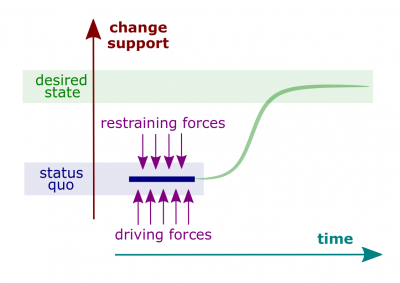Concept Management Quarter
Change Management Quarter (hereinafter, the Quarter) is a lecture introducing the learners to portfolio implementations primarily through key topics related to iterative development. The Quarter is the last of four lectures of Portfolio Quadrivium, which is the first of seven modules of Septem Artes Administrativi (hereinafter, the Course). The Course is designed to introduce the learners to general concepts in business administration, management, and organizational behavior.
Contents
Outline
Enterprise Architecture Quarter is the predecessor lecture. In the enterprise design series, the previous lecture is Organizational Culture Quarter.
- Portfolio implementation is the enterprise implementation of the enterprise portfolio. This lecture concentrates on iterative development because this development is the main technique to do that.
Concepts
- Change management. (1) The management of change and development within an enterprise; (2) The controlled identification and implementation of required changes within a computer system.
- Enterprise change management. Practice and a set of concepts based on that practice of preparing and supporting of enterprises, their stakeholders and technology in making enterprise change.
- Enterprise goal. A desired outcome towards which the enterprise effort is directed.
- Goal (objective). Desired outcome or target.
- Real goal. A goal that an organization actually pursues, as defined by the actions of its members.
- Means-end chain. An integrated network of goals in which the accomplishment of goals at one level serves as the means for achieving the goals, or ends, at the next level.
- Stated goal. An official statement of what an organization says, and what it wants its various stakeholders to believe, its goals are.
- Vision statement. A formal articulation of an organization's vision or mission.
- Business goal. A state or condition the business must satisfy to reach its vision.
- Business policy. A business policy is a non-actionable directive that supports a business goal.
- Business rule(s). A business rule is a specific, actionable, testable directive that is under the control of the business and supports a business policy.
- Business plan. A written document that interprets the strategic plan for enterprise stakeholders, for instance, financial or governmental institutions with regard to a business opportunity and articulation of how the identified opportunity is to be seized and exploited.
- Enterprise administration. Practice and a set of concepts, based on that practice, that define culture of administering all enterprise efforts from identifying business opportunities and up to getting of all enterprise outcomes and/or achieving enterprise impacts.
- Administration. The process or activity of running a business, organization, etc. or the officials who executive that process or activity.
- Management. The process or activity of dealing with or controlling things or people.
- Strategic management. What managers do to develop the enterprise's strategies, policies, and operative rules.
- Enterprise objective. A measureable step taken in order to achieve the enterprise goal.
- Objective. A target or metric that an individual, group, and/or enterprise seeks to meet in order to progress towards a goal.
- Strategic management process. A six-step process that encompasses strategic planning, implementation, and evaluation.
- Change resistance source.
Category Change resistance source Individual change-resistance source Enterprise change-resistance source - Kaizen. In Japanese, the word means "improvement". This is the philosophy of continuous process improvement using analytical tools and methods.
- Paradox theory. The theory that the key paradox in management is that there is no final status for an enterprise.
Roles
Methods
- Change-promoting technique.
- Development methodology.
- Methodology. A set of processes, rules, templates, and working methods that prescribe how business analysis, solution development and implementation is performed in a particular context.
- Plan-driven methodology. Any methodology that emphasizes planning and formal documentation of the processes used to accomplish a project and of the results of the project. Plan-driven methodologies emphasize the reduction of risk and control over outcomes over the rapid delivery of a solution.
- Change-driven methodology. A methodology that focuses on rapid delivery of solution capabilities in an incremental fashion and direct involvement of stakeholders to gather feedback on the solution's performance.
Instruments
- Change implementation model.
Step Objective Suggested actions 1 Sense of urgency - Consider possible change agents and resisting forces.
- Create a compelling reason for why change is needed.
- Communicate the reason to the entire enterprise or potential change agents.
2 Coalition - Form a coalition with enough power to lead the change.
3 Vision - Using the created coalition, formulate a new vision to direct change and strategies for achieving the vision.
4 Official announcement - Make the vision official.
- Communicate both the vision and, possibly, its reasoning and achieving strategies.
- Enlist a volunteer army.
5 Coalition empowerment - Empower others to act on the vision by removing barriers to change and encouraging risk taking and creative problem solving.
6 First results - Plan for, create, and reward short-term "wins: that move the enterprise toward the new vision.
7 Meeting challenges - Consolidate improvements.
- Reassess changes.
- Make necessary adjustments in the new programs.
- Sustain acceleration.
8 Change institutionalization - Reinforce the changes by demonstrating the relationship between new behaviors and enterprise success.
- Change process model.
Results
- Strategic plan. A plan that applies to the entire enterprise, formalizes its enterprise portfolio, and establishes the enterprise's overall goals. This plan also defines its business models and may or may not include related competitive strategies.
- Strategy. The plan for how the organization will do what it's in business to do, how it will compete successfully, and how it will attract and satisfy its customers in order to achieve its goals.
- Commitment concept. Plans should extend for enough to meet those commitments made when the plans were developed.
- Roadmap. A strategic plan to create a product or complete a project. A roadmap describes the individual steps required to meet a set of goals or objectives.
Practices
- Some practitioners believe that business plans have no value for the business itself.
Indeed, it is impossible or almost impossible to predict revenues with no historical data. Furthermore, every bank asks about a business plan, but no real bank provides a business with external funding based on a business plan alone. Taking into consideration these observations, business plans may be considered as documents that banks need in order to report to the government and to use in their public relations that the banks support business.No business plan survives first contact with customers -- Steve Blank, entrepreneur
Validated Learning Quarter is the successor lecture. In the enterprise implementation series, the next lecture is Project Management Quarter.

